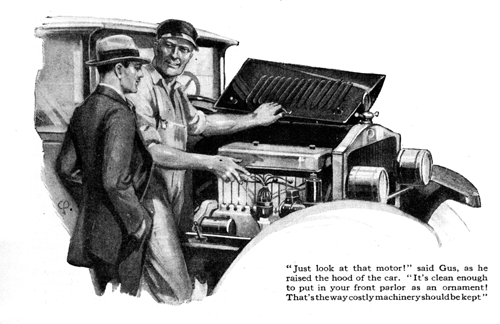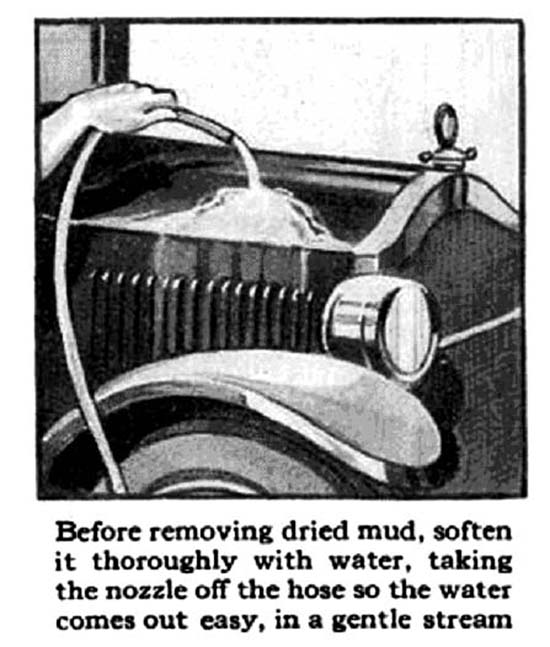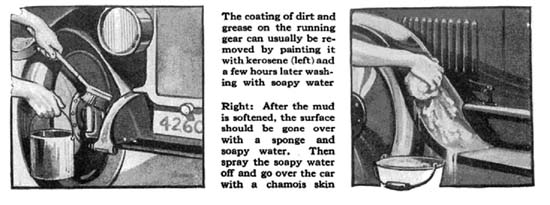August 1926
How To...
KEEP YOUR CAR
IN THE PINK OF CONDITION
by Martin Bunn
Washing an Auto Right Isn't So Simple, Says Gus -

"And I ought to sue' em for damages, too!" growled Paul Murray in winding up a heated tirade against auto manufacturers in general and the makers of his own car in particular. He glowered at his shabby-looking car as he turned to Gus Wilson for sympathy.
"Aw, forget it," suggested Gus disgustedly. "If the finish on this car is on the blink it's your fault. "Why didn't you take better care of it? You seem to think that a paint job ought to last forever even when you leave the bus standing for days at a time in the hot sun with half the mud in Benton County caked on it.
"If you think the factory did a bum job on your car, just come in here and I'll show you something," he finished, leading the way toward the back of the Model Garage where Joe Clark, his partner, was checking up the work that had been done on a customer's car.
"Take a look at that bus," said Gus. "It came out of the factory about the same time yours did, and the speedometer shows as many miles. Like new, isn't it?"
Murray silently inspected the car Gus pointed out. He glanced at the speedometer. "Gee whiz, Gus! I can hardly believe it," he exclaimed wonderingly. "How in blazes did he ever keep it so new? I'll bet he never takes it out if it even looks like rain!"
"Humph!" growled Gus. "The owner of that car goes out in any kind of weather. Rain doesn't stop him any more than it would a duck."
"Let me in on the secret, Gus, "Murray begged. "I certainly can see I've got something to learn about keeping a car.
"Glad to," replied Gus. "There really isn't an awful lot to it once you get a good idea of what you are trying to do. The first thing to remember is that it's a whole lot better to give your car a little attention quite often than it is to wait until the car gets so bad that the womenfolk won't go out with you any more.
"And then you must always remember that what looks like nice, soft road dust is really ground up sand -- in fact, if you glued it onto a flat surface you could use it for sandpaper. The rough particles in dust will scratch hardened steel, and the paint enamel or lacquer finish on your car is a whole lot softer than hard steel.
"Really, the whole trick in cleaning a car is to get the dirt off it without scratching off the finish, too. A fresh coat of dry dust is easy to remove. You can flick if off with a feather or wood duster. But dust in the form of mud that has dried and caked up sticks to beat the band."
"So I've found," Murray broke in. "And if you try to rub it off, the paint comes with it -- or at least all the gloss anyway."
"Don't try to rub it off," Gus went on. "The way to get rid of dry mud is to soften it with soapy water so it will come off with a very gentle rub with a soft sponge. Don't be afraid to use plenty of water when you are washing a car. Let the mud alone until the water has had time to soak into it thoroughly. Take the nozzle off the hose before you start so that the water can run out in a gentle stream. If you stand off about ten feet and squirt it the force of the stream drives the gritty dust right into the paint.
"After you have it wet down, and the caked mud has turned to a soggy brown color showing that the water has soaked into it, go over the surface with a sponge and soapy water. A fistful of soft, yellow auto soap dissolved in a pail of water is strong enough. Cold water is all right but it is better to have it lukewarm -- don't leave it hot. You will find that the mud will loosen up and then when you flow a lot more water over the surface the particles of mud and the soapy water will be carried away leaving a clean, wet surface. Don't make the mistake of trying to soap the whole car at one time. Do a few square feet and then flow off the mud and soap because if you try to go all around the car with the soap you will find that it has dried in streaks by the time you get around to where you started.
"Wait a few minutes after you have run off the last of the soap and mud and then get busy with a piece of chamois skin and remove all the little drops of water that remain. If you let them dry on the finish they will leave spots."
"Gosh!" exclaimed Murray. "That's a whole of lot of work to be done every time I get home from a ride."
"Who said every time?" Gus grunted.
"It's much better to avoid washing if possible. Of course if you have been out in the rain and the car is covered with mud, the best time to wash it is right away before the mud has a chance to get hard. But if you make a practice of going over the whole car with a duster every time you put it away in the garage, you can go for weeks at a time without washing it at all. And if the car is not dusty, the rain won't spot it so bad.
"After you have wiped off the body with the chamois skin to remove all the water, take an old piece of soft silk and polish the body with it. Somehow, silk is better than cotton as a polisher, especially on enamel and these new lacquer finishes."
"How about the running gear?" Murray questioned. "That always gets covered with a coating of dirt all gummed on with grease. Can you get that off with soap too?"
"If it hasn't been there so long that it is nearly as hard as a rock, you can," Gus answered. "Paint the steering knuckles and parts like that with a little kerosene a few hours before you start washing and you will find that the kerosene will cut the dirt loose so that the soapy water will have a chance to remove it. Gasoline will do of course, but kerosene is better.
There isn't much of a shiny finish to the paint on axles and running gear anyway so if you wipe them off with an old rag now and then, the washing job will be much easier."
"But how do you get rid of those rust spots around the corners and bolts?' Murray interrupted again.
"Well, washing won't take rust off," Gus answered, "But keep your eyes peeled and whenever you see signs of rust starting be sure to scrape away as much of the rust as you can with your knife blade and then get out the paint brush and touch up the spot. If you don't, the rust will eat its way along under the finish and the spot will grow larger and larger. Of course it makes more progress with some types of auto finish than with others, but no matter what kind of protective coating you have on your car rust will ruin it in time if you don't watch out.
"Why, I've seen a mud guard that looked all right from the top and yet you could stick your thumb through it almost anywhere. Stones bouncing up from the road had cut through the finish and after several years of rusting, there was nothing left but a thin shell of rust underneath the enamel!"
"How would it do to take the car into one of these 'auto laundries' once a month and have it cleaned right?" suggested Murray.
"That's a better idea than letting it go without cleaning, provided that the place really understands how to use the high pressure air cleaning system," Gus replied thoughtfully, "If you know a place where they know how to do the job right and get all the dirt off without harming the finish, you're in luck.
"Here's something you won't see often," Gus went on as he carefully raised the hood of the well-groomed car, "Just look at that motor. It's clean enough to put in your front parlor as an ornament! That's the way expensive machinery should be kept if you want to get the best possible service out of it, and besides, it's a pleasure to work on a clean motor. You don't have to put on overalls every time you have to change a spark plug or take a look at the breaker points."
"The owner must spend a lot of time to keep it that clean," said Murray admiringly.
"Not so much," said Gus. "About once a month he runs it out back of the garage and gets busy with a pan of kerosene and a paint brush. The kerosene washes away the dirt and wiping with dry rags takes off the film of kerosene and there you are!"
"Gosh!" Murray exclaimed, "I guess the answer is to get a good paint job done on my bus and then take good care of it. Tell me whom you would recommend to do the work and I'll run along and not bother you any more."
"Bet you my flivver against a busted cotter pin that his car will look just as bad a year from today," grinned Joe Clark after Murray had gone.
"Nothing doing!" Gus replied, "I'd sure lose the cotter pin. He's not the kind that cares enough about machinery to take good care of it -- but it will keep him amused for a while at any rate!"
END
L. Osbone 2019

